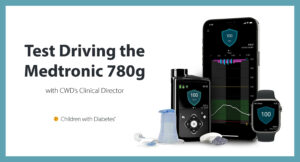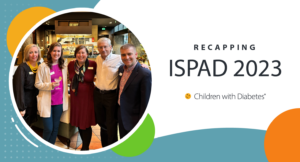CWD News
Celebrating the Wins in Diabetes
When you’re living with diabetes, or loving someone with diabetes, you have to stay resilient as much as you can. It’s a marathon, not a sprint, and you have to be able to make it to the end one way or another. One of the things that helps me maintain my resilience with diabetes is celebrating the wins. Acknowledge the Suck I’m not suggesting that you focus only on the positives, because, as previously stated, there will be a lot of times when diabetes will make it impossible to see the positives. So, make sure you also acknowledge the “suck” […]
Read MoreRinging in NDAM with our Friends at embecta
Honk honk! HONK HONK! Hooonkkkk hoooonnnkkkkk! If you listen closely, you can almost hear the sounds of the taxis on the streets of New York City, right? As the CWD Team returns from the Big Apple, we can’t wait to share with you a brief recap of our experiences at Nasdaq in New York City. The Children with Diabetes team was invited by our Friends for Life at embecta to help ring the opening bell of the NY Stock Exchange on October 31 as a kick off to National Diabetes Awareness Month. At the event, Children with Diabetes joined forces […]
Read MoreTest driving the Medtronic 780g
Each time I try a new automated insulin delivery (AID) system, I find there are things I like and dislike about the system. As with most things, you have to find something that works for you and your diabetes management goals. For me, one of my main goals for diabetes management is to reduce my burden while getting optimal Time in Range (TIR). For the last few weeks, I have been trying out the Medtronic 780G and I’d like to share my thoughts about the system. Not the Old Medtronic CGM Those of us who have been around the block […]
Read MoreISPAD 2023 Recap
Goedemorgen! The Children with Diabetes team has just returned from Rotterdam, Netherlands and the 49th Annual ISPAD (International Society for Pediatric and Adolescent Diabetes) Conference. We’ve had an amazing week connecting with our best diabetes Friends for Life in Europe and can’t wait to tell you all about our experiences abroad. Grab some french fries with a side of sweet ketchup and mayonnaise and let’s recap ISPAD 2023! Rotterdam, Netherlands The CWD team left different parts of the United States and flew overnight to Amsterdam, Netherlands. We were excited to connect in the Amsterdam airport, grab our luggage, and then […]
Read MoreFriends for Life White Plains 2023 Recap
It’s been a little over week now since the Children with Diabetes team returned from White Plains, New York. We’ve just concluded our Fall Friends for Life (White Plains) conference and our diabetes fuel tanks are overflowing after spending a long weekend with our Fiffles. Grab your hot apple cider and join me on a look back at FFL White Plains! Our conference weekend opened on Friday evening with registration where attendees were given their nametag lanyards and their orange or green wristbands. People with diabetes were given the familiar green wristband while the people that don’t have diabetes but […]
Read MoreCareers in Diabetes
There are a lot of opportunities to make life with diabetes meaningful. One of the ways some PWD do this is through their career. I know myself, along with many of my friends, have done this through a variety of ways. It’s definitely not for everyone – because when you work in diabetes and live with it, it can feel like too much diabetes. These lists are not all inclusive, but just some examples to give you a few ideas. Healthcare Professional Paths This one may be a little obvious, but what you may not know is that there are […]
Read MorePreparing for International Travel with T1D
When you’re traveling overseas and you have T1D, there are a number of considerations. Make sure you have a passport or visa to allow you to travel (and it’s not expired), pack the appropriate clothing, and, of course, pack enough diabetes supplies to last the whole trip. But what exactly does that look like? It depends on what you use to manage your diabetes. Here are some tips for preparing for international travel with diabetes. Bring More Than Enough Supplies If you’re using an insulin pump, pack enough to change the pump out every day of the trip. This will […]
Read MoreCool Tools for Diabetes
There are so many newer tools that can help you manage diabetes and it can be hard to keep up with what options are available. There are also companies that let you personalize your diabetes devices and add a little fun and whimsy into your life. Here are some that we know about – Glucose Displays There are a couple of options that allow for quick, easy visualization of the range of glucose your loved one with diabetes is currently experiencing. Glowcose – A small glowing display that changes color based on the glucose level. The thresh-olds are personalized and […]
Read MoreExpectations versus Reality of Glucose Monitoring
Shaping Expectations at Diagnosis I feel very fortunate to not have much memory of my diagnosis. I was only 2 years old, and the only memories I have include a vague vision of a hospital room and my experience talking to my first diabetes psychologist. The diabetes psychologist memory is more vivid, and I remember coloring in a large room at a little toddler sized table and chair while a lady asked me questions. I remember thinking, “Why is she asking me questions? All I want to do is color.” What I do know about my family’s diagnosis experience I’ve […]
Read MoreTransforming Diabetes Education: Inside the Friends for Life Fellows Experience
The Friends for Life Fellows program was designed to help give healthcare professionals in training some very hands-on diabetes training. These are not necessarily specific skills, but more of a “diabetes-in-the-wild” and the reality of what living with diabetes looks like for the whole family experience. This past year, I had the privilege of coordinating the Fellows program for FFL, which was a really rewarding experience. What are fellows? In general, in medicine, fellows are physicians in training who are almost attending providers – those who you call “Doctor.” For the purposes of FFL, we want to make sure it […]
Read More









